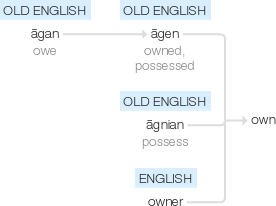Own
Old English āgen (adjective and pronoun) ‘owned, possessed’, past participle of āgan ‘owe’; the verb (Old English āgnian ‘possess’, also ‘make own's own’) was originally from the adjective, later probably reintroduced from owner.
wiktionary
From Middle English owen, aȝen, from Old English āgen(“own, proper, peculiar”), originally the past participle of āgan; from Proto-West Germanic *aigan(“own”), from Proto-Germanic *aiganaz(“own”), from Proto-Indo-European *h₂eyḱ-(“to have, possess”).
A back-formation from owner, owning and own(adjective). Compare Old English āgnian, Dutch eigenen, German eignen, Swedish ägna.
etymonline
own (adj.)
"properly or exclusively belonging to one's self or itself," Middle English ouen, from Old English agen, literally "possessed by," from Proto-Germanic *aiganaz "possessed, owned" (source also of Old Saxon egan, Old Frisian egin, Old Norse eiginn, Dutch eigen, German eigen "own"), from past participle of PIE root *aik- "be master of, possess," source of Old English agan "to have" (see owe). Emphatic use after a possessive noun or pronoun is from late Old English. To hold one's own "maintain one's position" is by 1520s.
own (v.)
c. 1200, ounen, ahnen, "to possess, have; rule, be in command of, have authority over;" from Old English geagnian, from root agan "to have, to own" (see owe), and in part from the adjective own (q.v.). It became obsolete after c. 1300, but was revived early 17c., in part as a back-formation of owner (mid-14c.), which continued. From c. 1300 as "to acknowledge, concede, admit as a fact," said especially of things to one's disadvantage. To own up "make full confession" is from 1853. Related: Owned; owning.
